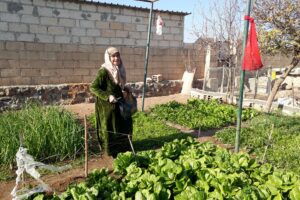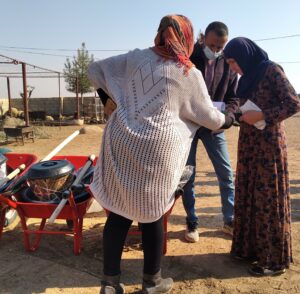In Syria, where food insecurity affects nearly 60 percent of people,[1] women are working hard to make sure their families and neighbors have enough to eat.
Lamaa, who lives in northeast Syria, is no exception. Amidst the civil war, she has sustained her family on a small income from the few goats that she keeps, but it’s not always enough to pay for food.

Lamaa stands in her homestead vegetable garden that she started with support from the SAFER project.
The Shelter and Food Emergency Response (SAFER) project, funded by USAID’s Bureau for Humanitarian Assistance, is fighting food insecurity in Syria is by building families’ capacity to grow their own homestead vegetable gardens.
Since Blumont started implementing the program in 2021, SAFER has helped about 1,000 households (225 of them woman-led households) start their own gardens. The gardens make nutritious food accessible for families and provide an opportunity to earn income by selling products in their communities.

Lamaa received training, seeds, and fertilizer to help her start a vegetable garden.
Lamaa received agriculture training, seeds, and fertilizer. After the first growing season, she and her family already have a variety of winter vegetables to eat, such as radishes and lettuce, and will grow more in the coming seasons.
“The vegetable seeds we received were great… I am very excited to be able to provide for my family,” she said.
The SAFER team is currently installing a drip irrigation system for her garden so she can grow more produce and spend less time collecting water. Lamaa also learned how to make her own compost and use it as fertilizer for the next round of planting.
The more produce she can grow, the less she has to buy, freeing up funds for Lamaa to pay for medical treatments and other items her household needs.
In many cases, households with gardens sell their surplus vegetables and use the profits to buy other essential items. It’s a reliable, accessible income for women who care for children and elderly parents and are unable to work outside the home.
Before selling any of the extra food she grows, Lamaa always offers her vegetables for free to her neighbors, who struggle to bring enough food to the table. She prioritizes her neighbors’ wellbeing over making a profit at the market.
It is customary to share with neighbors, she said, as one day they may help her in return when she is in need.
[1] World Food Programme, 17 Feb 2021. https://www.wfp.org/news/twelve-million-syrians-now-grip-hunger-worn-down-conflict-and-soaring-food-prices



